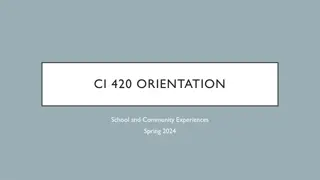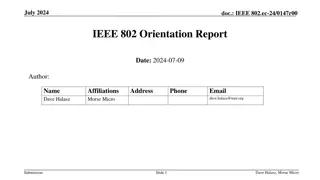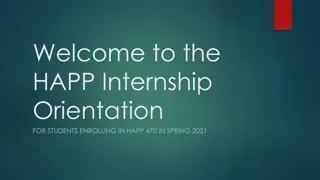Cooperating Teacher Orientation Spring 2024 - Student Teaching Middle Grades and Secondary Education
The Cooperating Teacher Orientation for Spring 2024 focuses on preparing educators for student teaching in middle grades and secondary education. The agenda covers course sequences, professional expectations, placement details, attendance requirements, and supporting candidates. With a strong emphasis on feedback, evaluations, and professional behavior, this orientation provides a roadmap for a successful teaching experience.
Download Presentation

Please find below an Image/Link to download the presentation.
The content on the website is provided AS IS for your information and personal use only. It may not be sold, licensed, or shared on other websites without obtaining consent from the author.If you encounter any issues during the download, it is possible that the publisher has removed the file from their server.
You are allowed to download the files provided on this website for personal or commercial use, subject to the condition that they are used lawfully. All files are the property of their respective owners.
The content on the website is provided AS IS for your information and personal use only. It may not be sold, licensed, or shared on other websites without obtaining consent from the author.
E N D
Presentation Transcript
COOPERATING TEACHER ORIENTATION Spring 2024 Student Teaching Middle Grades and Secondary Education
Welcome Course sequence Expectations Professional Expectations Placement AGENDA Giving feedback Evaluations Tuition waivers Questions?
WELCOME! Introductions Dr. Cara Gutzmer, Director, School and Community Experiences Sue Talbott, Clinical Experiences Specialist Danielle Galardy, Office Manager Did you host someone this fall? Share a success!
ATTENDANCE January 8-April 26 Four sick days and one professional day (any others must be made up) Teach Abroad done on March 8 and are allowed THREE absences
PROFESSIONAL EXPECTATIONS Promptness Mature and appropriate attire and hygiene Communication Engagement Follow assigned district s calendar NOT UIUC s PROFESSIONAL BEHAVIOR CHECKLIST
PLACEMENT EXPECTATIONS Six observations (First observation is a meeting) Takeover minimum of 20 days Midterm/Final evaluation Content test No edTPA Timeline: https://sce.education.illinois.edu/cooperating- teachers/secondary/edpr442sec-coop Teach Abroad: three observations plus final evaluation
SUPPORTING YOUR CANDIDATE Model Reinforce Weekly feedback Communicate with supervisor
STAGES OF LEARNING This is a slide we share with candidates.
WHAT DO CANDIDATES NEED IN THIS STAGE? LOTS of Affirmation Practice Support Patience Opportunities to try new things Tips and tricks from a seasoned professional
GRADUAL RELEASE https://sce.education.illinois.edu/docs/librariesprovider33/default-document- library/sp23-student-teaching-timeline.docx?sfvrsn=812b96ac_3
EVALUATIONS Observation feedback Weekly written feedback (any format is acceptable) Midterm/Final Portal: https://cote.illinois.edu/cote-portal-access Support plans
SUPPORTS Disposition Concern Form Remediation Plan Professional Growth Plan
THE SUPERVISOR Role, responsibility Please contact your student's supervisor with any concerns or praise! Communication
IMMEDIATE ACTIONS TO WELCOME YOUR CANDIDATE Exchange contact information (set boundaries!) Show them where to put their belongings Tour the school Introduce them to staff Show them how to access your online curriculum and classroom (work with district IT to get them an email account) Have them introduce themselves to the students in a creative way Post their name on the board Be clear and specific about what you would like them to do the first few days and weeks
TUITION WAIVERS Non-degree vs. Master s/Endorsement/Doctoral Contact Council on Teacher Education with questions! cote-waivers@illinois.edu https://cote.illinois.edu/cooperating-personnel-supervisors/cp-tuition-fee-waivers
SUB OPPORTUNITIES Candidates have been encouraged to apply for their sub license May be able to sub for cooperating teacher for a limited number of days More information will be available in January
RESOURCES SCE: https://sce.education.illinois.edu/ Professional Behavior Checklist Student Teaching Guidelines Weekly Feedback Form Portal: https://cote.illinois.edu/cote-portal-access Midterm/Final Approve hours FAQs re: waivers PDH entry Email Cara or Sue directly: caraknox@illinois.edu (middle grades and secondary) stalbott@illinois.edu (early childhood and elementary) sce@education.Illinois.edu (general questions)
GIVING FEEDBACK Why is feedback important? How do you reinforce the students in your class? How do you correct and shape students in your class? Do you approach feedback differently with your teacher candidates? Ratio of positive to negative Timeliness Frequency How does your use of feedback reflect on you as a leader?
UNEXPECTED NEGATIVE FEEDBACK (IT'S AWKWARD FOR EVERYONE) "I have some feedback for you, and it may be uncomfortable. I feel a bit uncomfortable myself, but I care about you and your development more than I care about how uncomfortable I feel. So, if you're feeling a little unsure about what to expect here, we are in this together. Can we talk a bit about _____________ ?"
IN PRAISE OF POSITIVE FEEDBACK https://www.forbes.com/sites/alisacohn/2017/07/21/in-praise-of- positive-feedback/?sh=394b7696db65 (the article has a billion pop- ups, so here are some highlights for your reference) 1. Embrace the need to give positive feedback. As with everything, the first step is to get your mind set right. You may have your own blocks against giving positive feedback you might think that you don t need it so your employees shouldn t. You might not want to over- praise for fear of giving someone a big ego, or you might simply be uncomfortable. Please get over it. Study after study show that positive feedback increases employee performance. Accept this truth.
2. Look for opportunities to give positive feedback. Once you buy in to the idea that increasing positive feedback is necessary, you might justifiably not be sure what to praise. Spend some time really tuning in to what s positive about what your employees are doing. No, you don t have to praise someone for simply coming in on time, but you could certainly praise someone who has done a good job day in and day out over a period of time. If someone exceeds your expectations even in a small way tell them. Be specific. Here s an example of a script you could use when someone is just doing a good job at her job: Perhaps your sales executive is supposed to set targets with the team and then meet them. That s her job. Even so .when she sets targets and meets them quarter after quarter, what s wrong with pointing it out? That can simply look like Gosh, Mary, you set challenging targets for your team and then meet them, quarter after quarter. If only Swiss watches were as reliable as you! You do a great job for us and I want you to know I appreciate it.
3. Make sure you say it (or write it.) Sometimes we humans think that people read our minds. You might notice a person doing something worthy of positive feedback or praise. You may register this good job and it may make you happy so happy that you forget to go tell the person. Or you may simply feel awkward to be that proactive or direct with someone. Find ways to trigger yourself to tell this person. If a manager feels positively about the employee or about the work she just did, often they won t say anything.
4. Dont make it a sandwich. I just wrote about the evils of the feedback sandwich. Don t think that you have to balance out positive feedback with constructive feedback. In fact, the opposite is true. When you give enough straight positive feedback to your employees you ve demonstrated that you are an ally. You can then give constructive or directive or critical feedback to your employees when they need it without sugar coating it.
5. Encourage employees to give each other positive feedback. Creating a climate of positivity and feedback around you is a marker of a master manager. You can do this informally by simply suggesting that one of your employees go tell another that they did a good job on something or that they helped. You can also give praise publicly in team meetings and other forums to reinforce this kind of behavior. You can also encourage this formally by incorporating into your team values or asking everyone to share positive feedback about another team member in a monthly team meeting. To make this meaningful you have to role model the behavior yourself see number 1!























